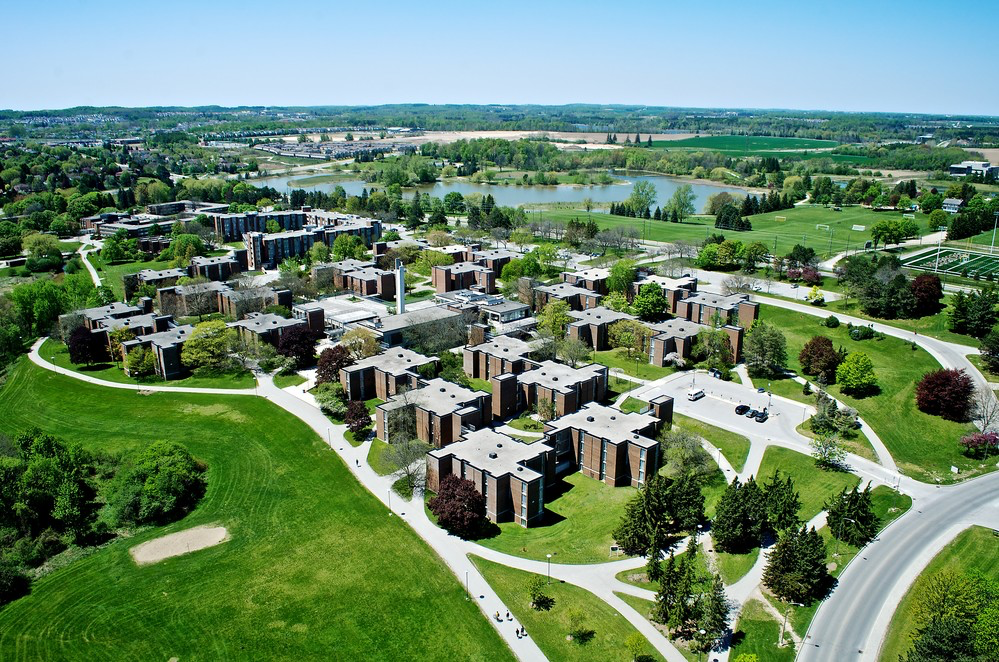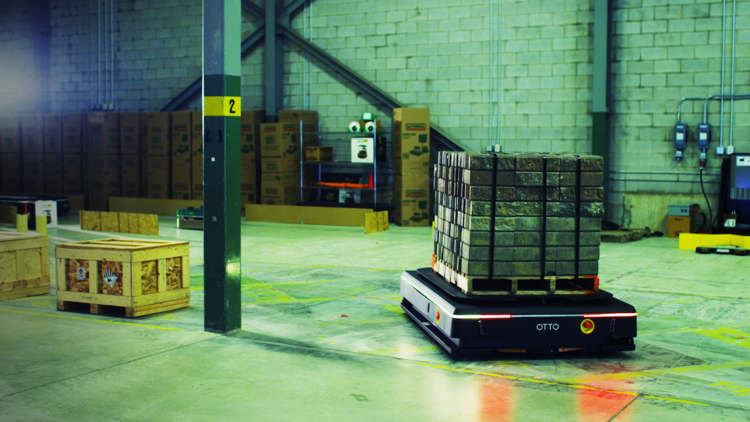Editor:
Brandon Sweet
University Communications
bulletin@uwaterloo.ca
A primer on accessing Plant Operations services this fall

A message from Plant Operations.
With the Fall term fast approaching, Plant Operations is sharing some important information on how to ensure your requests are handled efficiently and some new ways to stay in touch.
Submitting service and maintenance requests
For service issues, Plant Operations has a 24/7 Emergency Service Line: 519-888-4567 ext. 43793. This number is supported by dispatch Monday through Friday from 8:30 a.m. – 4:30 p.m., and available for urgent campus issues after hours.
The Plant Operations maintenance email pltops.maintenance@uwaterloo.ca is also monitored by dispatch Monday through Friday from 8:30 a.m. – 4:30 p.m. for routine non urgent issues. Contacting any tradesperson or leader directly is discouraged.
All maintenance requests to dispatch are entered into maintenance software (Archibus) and prioritized according to the problem type at the specific trade level. Using this system allows for effective tracking of work and ensures a timely follow up to all requests. It also supports Plant Operations in supporting their leaders to disconnect from work after business hours.
There are three ways Faculty and Staff can enter a routine maintenance request:
- 519-888-4567 x 43793 Dispatch
- Use client workplace portal for billable (includes design and construction services) and non-billable work requests on the Plant Operations website. Instructional videos are available, but you are encouraged to contact Dayna Chan dayna.chan@uwaterloo.ca for education and support as required.
- Use pltops.maintenance@uwaterloo.ca
Stay connected
Please subscribe for the system interruption notices on our Service Interruptions page. These are also posted on the Plant Operations home page on the right side.
You can also follow them on their NEW Twitter account, @uwplantops. This account will post interesting facts about campus infrastructure, grounds and custodial work, and highlight service interruptions. Please note this will support, not replace, the service interruption program not replacing it.
Thank you in advance for supporting these communication channels.
Q and A with the experts: Canada's energy security


Experts expect energy costs to keep rising in several countries. For example, Britain’s cap on domestic energy prices will likely increase by 70 per cent in October and remain high until at least 2024. Xianguo Li, professor in the Department of Mechanical and Mechatronics Engineering at the University of Waterloo, answers questions about the state of Canada’s energy security.
What has prevented Canada from experiencing a massive spike in energy bills, as seen in countries such as England?
Canada is fortunate to have a vast land mass with abundant natural resources, including energy. As a result, Canada has diverse and reliable energy resources, both renewable and non-renewable, such as traditional oil and gas, coal, nuclear-using uranium, and renewables like hydro, solar, wind, tidal and biomass. In the past many years, Canada has also been positioned for the energy transition to clean and sustainable energies based on local energy resources like solar and wind, reducing the impact of international energy price fluctuations. As the world’s fifth-largest energy producer and the eighth-largest consumer of energy, Canada has sufficient energy resources to provide a buffer to the international energy price spike. However, as a market economy, Canada is influenced by the changes beyond our borders. Therefore, mechanisms and policies must be in place to prevent Canada from being drastically influenced by international markets and events.
What can Canada do to prevent a massive spike in energy bills?
Canadians have already been seeing significant increases in energy bills, be it hydro bills or gas prices at the pump. To prevent a drastic rise, we need to decarbonize the energy sector; the use of traditional fossil fuels needs to be reduced, while non-carbon-based fuels and energy resources like renewables are being promoted. However, traditional fossil fuels are cheap and reliable, and related infrastructure is already functional and available. To transition into sustainable energy systems, new infrastructure needs to be built, and operation and maintenance practices and protocols need to be developed and established.
How can Canada improve energy security?
Canada’s diverse mix of non-renewable and renewable energy and as an energy export nation provides energy security compared with many other energy-import nations. However, energy security in Canada can be improved by further diversifying energy resources and harvesting and using local and regional energy resources, especially renewables like solar and wind, with smart energy systems for energy harvesting, distribution and consumption.
Another issue is the low energy intensity in Canada, which should be improved substantially to reduce total energy demand considerably. Canada’s per capita energy consumption is ranked among the highest in the world, almost three times that of the United Kingdom, indicating substantial room for improvement in the reduction of energy demand. This can be accomplished by changing daily routines, such as setting higher building/room temperature in the summer to reduce the use of air conditioning and lower temperature in the winter to reduce heating requirements; improving building/house insulation is another measure that we can take.
Also, transitioning to more renewables and improving energy intensity will significantly help Canada to achieve its emission reduction target of 40 per cent below 2005 levels by 2030 and net-zero emissions by 2050.
Xianguo Li is a Mechanical and Mechatronics Engineering Professor at the University of Waterloo. Professor Li's main research interests and activities are in the area of thermal fluid/science, including energy systems and energy storage, various energy conversion devices, propulsion and power generation systems, aerosol generation and applications, and transportation fuel cell and battery systems.
From building robots in the basement to putting algorithms on the moon

By Rose Simone. This article was originally published in the Spring 2022 issue of Waterloo Magazine.

About 13 years ago, four friends and Mechatronics Engineering students at the University of Waterloo – Matt Rendall (BASc ’08, MBET ’09), Ryan Gariepy (BASc ’09, MASc ’12), Pat Martinson (BASc ’09) and Bryan Webb (BASc ’09) – started building robots.
It was an interest that grew from their involvement in the UW Robotics Team and then carried on into their final-year engineering project, which became an idea for a company.
But it wasn’t long before they were running out of space.
“Robots take up a lot of space and so pretty soon, they were spilling out all over the place. We had some access to the robotics lab at the University; we had some space at the Accelerator Centre and we were using one of the founder’s basements,” says Rendall, chief executive officer of Clearpath Robotics, about how the company got started.
Customers in 50+ countries
From those humble beginnings, Clearpath became a multi-million-dollar global enterprise that now employs 320 people, mostly in Waterloo region but also elsewhere in the world. It has customers in at least 50 countries.
Clearpath now has an entire business unit devoted to autonomous vehicle technology that can move parts or products from one part of a warehouse or manufacturing plant to another. That business unit, OTTO Motors has “a portfolio of products and autonomous vehicle fleets running in some of the biggest plants in some of the most important manufacturing economies in the world,” Rendall says.
The company has also been increasingly integrating its software into other robots that work on factory floors.

Software to drive the rover on the moon
The Canadian Space Agency recently announced plans to send a robotic lunar rover to the moon in 2026. In that project, Brampton-based MDA, developer of the Canadarm, is working with Clearpath Robotics to develop the software that will drive the rover on the moon. “We have a long history in aerospace. This project that we just announced is continuing to build on that heritage.”
When Rendall is asked about Clearpath’s success, he will cite the combination of factors.
“I would say the intellectual property policy at the University of Waterloo, where you can own everything that you invent, plays a big role.”
The co-op program is another factor, he adds. “We have sharp young minds coming in and learning engineering at the university, but then they go into workplaces where they figure out not only how to apply those skills but also have opportunities to identify real-world problems and try to solve them,” Rendall says. Those solutions sometimes become companies in their own right.
The academic programs offered at Waterloo also play a role, Rendall adds. The Mechatronics Engineering program was fairly new at Waterloo when he began working on his degree and he wanted to try something new and difficult. “It was supposed to be very challenging – the biggest challenge you could possibly sign up for.”
Undergraduate design projects spur innovation
Waterloo Engineering programs also incorporate a final year Capstone Design project that has the students conceptualizing and designing innovations based on their chosen discipline. That final year design challenge, supported by several awards, has resulted in numerous spinoff companies and technologies.
“After the fourth-year design project, you’ve already built the prototype, you’ve built the business plan, you’re already familiar with living like a student without any money. So why not just extend that a little bit longer and try making a company out of it?” Rendall asks.
The larger Waterloo ecosystem is simply a “powerful reinforcing mechanism” for startup companies, according to Rendall.
Exposure to the entrepreneurial mindset
“There are professors who are entrepreneurially minded and tend to gravitate to Waterloo because they want to focus on their innovations. The graduate students who work for them will also be entrepreneurially minded and the undergraduate students are also exposed to that mindset throughout their education.”
The Velocity incubator provides further infrastructure, guidance and support for the startup companies that emerge from that entrepreneurial ecosystem, Rendall adds.
The ecosystem becomes self-reinforcing as co-op students who work for startups see “how exciting early-stage companies can be and the impact they can have at those companies.” That same ecosystem helped Clearpath Robotics grow long after it was spun out of the University,
The ability to hire co-op students has been “pretty foundational,” Rendall says. “We built the company with a tremendous amount of support from co-op students.” The presence of the University also enabled the company to establish important research partnerships.
“I don’t know where else in Canada, you could have an autonomous vehicle company and have the same advantages that we have here,” Rendall says.
Link of the day
International Day of the Disappeared
When and Where to get support
Students can visit the Student Success Office online for supports including academic development, international student resources, immigration consulting, leadership development, exchange and study abroad, and opportunities to get involved.
Instructors looking for targeted support for developing online components for blended learning courses, transitioning remote to fully online courses, revising current online courses, and more please visit Agile Development | Centre for Extended Learning | University of Waterloo (uwaterloo.ca).
Instructors can visit the Keep Learning website to get support on adapting their teaching and learning plans for an online environment.
Course templates are available within your course in LEARN to help you build and edit your content and assignment pages quickly.
The following workshops, webinars, and events are offered by the KL team (CTE, CEL, ITMS, LIB):
-
Scholarship of Teaching and Learning (SoTL) Methods – self-directed, continuous self-enrollment course in LEARN.
-
Independent Blended Course Design (iBlend) - self-directed, continuous self-enrollment course in LEARN.
-
Copyright Overview for Waterloo Instructors and Staff - self-directed, continuous self-enrollment course in LEARN.
-
Independent Remote Course Design Essentials (iReCoDE) - self-directed, continuous self-enrollment course in LEARN.
-
Supporting Student Mental Health (for Instructors) – self-directed, continuous self-enrollment course in LEARN.
Supports are available for employees returning to campus. Visit IST’s Hybrid Work and Technology guidelines and workplace protocols to assist with the transition.
Students with permanent, temporary and suspected disabilities and disabling conditions (medical conditions, injuries, or trauma from discrimination, violence, or oppression) can register with AccessAbility Services for academic accommodations (classroom accommodations, testing accommodations, milestone accommodations).
Instructors can visit AccessAbility Services' Faculty and Staff web page for information about the Instructor/Faculty role in the accommodation process. Instructors/ Faculty members are legally required to accommodate students with disabilities. AccessAbility Services (AAS) is here to help you understand your obligations, and to offer services and resources to help you facilitate accommodations.
The Writing and Communication Centre has in-person and virtual services to support grad and undergrad students, postdocs and faculty with any writing or communication project. Services include one-to-one appointments, drop-ins at Dana Porter Library, online workshops, writing groups, English conversation practice, and custom in-class workshops.
Co-op students can get help finding a job and find supports to successfully work remotely, develop new skills, access wellness and career information, and contact a co-op or career advisor.
The Centre for Career Action (CCA) has services and programs to support undergrads, grad students, postdocs, alumni, and employees in figuring out what they value, what they’re good at, and how to access meaningful work, co-op, volunteer, or graduate/professional school opportunities. Questions about CCA's services? Live chat, call 519-888-4047, or stop by our front desk in the Tatham Centre 8:30 a.m. to 4:30 p.m., Monday to Friday.
Drop-in to Warrior Virtual Study Halls on Wednesdays from 5:30 p.m. to 7:00 p.m. Come together in this virtual space to set goals and work independently or in groups each week.
Renison's English Language Institute continues to offer virtual events and workshops to help students practice their English language skills.
If you feel overwhelmed or anxious and need to talk to somebody, please contact the University’s Campus Wellness services, either Health Services or Counselling Services. You can also contact the University's Centre for Mental Health Research and Treatment. Good2Talk is a post-secondary student helpline available to all students.
The Library is open with expanded hours for access to book stacks, drop-in individual study space, bookable group study rooms, drop-in access to computers and printers, book pick-up services and IST Help Desk support. Librarian consultations, Special Collections & Archives and the Geospatial Centre are available by appointment. Full details on current services and hours are available on the Library’s COVID-19 Update webpage.
The Faculty Association of the University of Waterloo (FAUW) continues to advocate for its members. Check out the FAUW blog for more information.
The University of Waterloo Staff Association (UWSA) continues to advocate for its members. Check out the UWSA blog for more information.
The Sexual Violence Prevention and Response Office (SVPRO) supports all members of the University of Waterloo campus community who have experienced, or been impacted, by sexual violence. This includes all students, staff, faculty and visitors on the main campus, the satellite campuses, and at the affiliated and federated Waterloo Institutes and Colleges. For support, email: svpro@uwaterloo.ca or visit the SVPRO website.
The Office of Indigenous Relations is a central hub that provides guidance, support, and resources to all Indigenous and non-Indigenous campus community members and oversees the University's Indigenization strategy.
The Waterloo Indigenous Student Centre, based at St. Paul’s University College, provides support and resources for Indigenous students, and educational outreach programs for the broader community, including lectures, and events.
WUSA supports for students:
Peer support - MATES, Glow Centre, RAISE, Women’s Centre - Click on one of the links to book an appointment either in person or online for the term.
Food Support Service food hampers are currently available from the Turnkey Desk 24/7 in the Student Life Centre. Drop-off locations are also open again in SLC, DC, DP, SCH, and all residences.
Co-op Connection all available online.
Centre for Academic Policy Support - CAPS is here to assist Waterloo undergraduates throughout their experience in navigating academic policy in the instances of filing petitions, grievances and appeals. Please contact them at caps@wusa.ca.
WUSA Student Legal Protection Program - Seeking legal counsel can be intimidating, especially if it’s your first time facing a legal issue. The legal assistance helpline provides quick access to legal advice in any area of law, including criminal. Just call 1-833-202-4571.
Empower Me is a confidential mental health and wellness service that connects students with qualified counsellors 24/7. They can be reached at 1-833-628-5589.
GSA-UW supports for graduate students:
The Graduate Student Association (GSA-UW) supports students’ academic and social experience and promotes their well-being.
Advising and Support - The GSA advises graduate students experiencing challenges and can help with navigating university policies & filing a grievance, appeal, or petition.
Mental Health covered by the Health Plan - The GSA Health Plan now has an 80 per cent coverage rate (up to $800/year) for Mental Health Practitioners. Your plan includes coverage for psychologists, registered social workers, psychotherapists, and clinical counselors.
Dental Care - The GSA Dental Plan covers 60 to 70 per cent of your dental costs and by visiting dental professionals who are members of the Studentcare Networks, you can receive an additional 20 to 30 per cent coverage.
Student Legal Protection Program - Your GSA fees give you access to unlimited legal advice, accessible via a toll-free helpline: +1-833-202-4571. This advice covers topics including housing disputes, employment disputes, and disputes with an academic institution.
The Graduate House: Open Monday to Tuesday 11:30 a.m. to 7:00 p.m. and Wednesday to Friday 11:30 a.m. to 9:00 p.m. We’re open to all students, faculty, staff, and community members. The Graduate House is a community space run by the GSA-UW. We’re adding new items to the menu. Graduate students who paid their fees can get discounts and free coffee. Note: The Graduate House is closed from August 20 to September 5, 2022.
When and Where (but mostly when)
Warriors vs. Laurier Blood Donation Battle. Join our “Waterloo Warriors” team on the Blood.ca website or app. #ItsInYouToGive
Warriors Youth Summer Day Camps, July 4 to September 2. Open to boys and girls age 5-18. Baseball, Basketball, Football, Hockey, Multi-Sport and Games & Volleyball. Register today.
Warriors Game Day Tickets and Season Passes, on sale now. Cheer on your Warriors W/M Basketball, Football W/M Hockey and W/M Volleyball teams at home during the 2022-23 season. Purchase today.
Visitors Centre in SCH closed, Monday, August 22 to Friday, September 2. Phone and email inquiries will be monitored during weekday business hours.
Retirement celebration for Ron Koelewijin, Wednesday, August 31, 2:00 p.m. to 4:00 p.m., South Side Marketplace dining hall.
TBH: To Be Honest premiere performance, Thursday, September 1, 3:00 p.m. to 4:00 p.m., PAC gym.
Labour Day holiday, Monday, September 5, most University operations closed.
Deadline to register for Centre for Extended Learning (CEL) "Getting Ready to Facilitate Online Courses: TA Training – Fall 2022" course, Sunday, September 11.